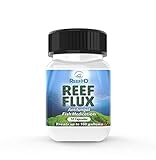Yes, calcium can be too high in a reef tank. If the calcium level gets too high, it can cause problems with the growth of corals and other marine life.
What are the consequences of having too much calcium in a reef tank?
Too much calcium can be a problem for reef tanks because it can lead to cloudy water, calcification of coral polyps, and other problems. Calcium can be found in many different sources, including seawater, coral skeletons, and the excretions of some fish.
It is important to keep calcium levels in reef tanks in check because too much can have negative consequences for the health of the reef. For reef tanks, too much calcium can lead to cloudy water.
Calcification of coral polyps can also occur when too much calcium is present in the water. Calcification is the process by which coral polyps turn into stone.
ReefHD Reef Flux Anti-Fungal Treatment (100 gal)
Red Sea Reef Energy Plus 500ml (AB+) All in One Coral Food for Saltwater Aquarium Marine Reef Tanks | Food for Soft, LPS, SPS, and Non-Photosynthetic Corals
$29.99 ($3.55 / Fl Oz) (as of June 28, 2025 07:40 GMT +03:00 - More infoProduct prices and availability are accurate as of the date/time indicated and are subject to change. Any price and availability information displayed on [relevant Amazon Site(s), as applicable] at the time of purchase will apply to the purchase of this product.)NICREW HyperReef 150 Gen 2 Reef LED Light, 150W Reef Aquarium Lighting for SPS LPS Corals and Saltwater Fish Tanks, Enhanced Violet and Blue Spectrum, Wide Angle Lens, 5 Channels Fully Programmable
$319.99 (as of June 28, 2025 07:40 GMT +03:00 - More infoProduct prices and availability are accurate as of the date/time indicated and are subject to change. Any price and availability information displayed on [relevant Amazon Site(s), as applicable] at the time of purchase will apply to the purchase of this product.)This can be problematic because it can make it difficult for coral to photosynthesize and for other plants to grow. It can also make it difficult for fish to swim and for coral to attach to the substrate.
Other problems can also occur when too much calcium is present in the water. These problems can include increased algae growth, decreased water clarity, and increased stress on the fish and coral in the tank.
All of these consequences can lead to decreased reef health and decreased biodiversity.
How can you tell if your reef tank has too much calcium?
It will depend on the specific conditions and parameters of your reef tank. However, one way to measure the level of calcium in a reef tank is to use a calcium test kit.
This kit will measure the levels of calcium in the water and will provide a report detailing the amount of calcium present. Over-dosing on calcium can lead to coral bleaching, fish deaths, and overall tank instability.
It is important to monitor calcium levels in your reef tank to ensure that they remain within a healthy range.
What are some possible causes of high calcium levels in a reef tank?
There are a few reasons why calcium levels can be high in a reef tank. One potential cause is if the tank is overstocked with fish, which will consume both the coral and the calcium in the water.
Another potential cause is if the tank is not being properly aerated. High levels of carbon dioxide in the water can lead to calcium levels becoming high, as the carbon dioxide blocks the absorption of calcium from the water.
Finally, a buildup of salt can also lead to high calcium levels.
How can you lower calcium levels in a reef tank?
In a reef tank, calcium is one of the most important elements because it helps corals grow and thrive. If levels become too low, however, it can have a negative impact on the health of the corals.
Fortunately, there are several ways to lower calcium levels in a reef tank.
- One way is to add coral skeleton to the tank. This will provide a source of calcium that the corals can use to grow.
- Another way is to add an alkalinity buffer to the tank. This will help keep calcium levels stable and prevent them from becoming too low.
- Finally, you can also add a coral food supplement to the tank. This will provide extra nutrients that the corals need in order to grow properly.
What is the ideal range for calcium levels in a reef tank?
The calcium levels in a reef tank should be maintained between 380ppm and to 450ppm. Lower levels of calcium can lead to coral bleaching and death, while higher levels can cause an imbalance in the coral community and a decline in coral growth.
A calcium test can be used to measure the level of calcium in a reef tank, and adjustments can be made to the water chemistry to maintain the desired levels.
Why is it important to maintain proper calcium levels in a reef tank?
A properly functioning reef tank depends on a balanced mix of marine organisms that can all survive and thrive on a calcium-rich substrate. Proper calcium levels in the tank will ensure that the coral and other invertebrates have the materials they need to grow and reproduce.
Additionally, calcium helps to regulate the pH of the water, which is essential for the health of the reef tank’s inhabitants.
What are some common problems associated with high calcium levels in a reef tank?
One of the most common problems associated with high calcium levels in a reef tank is coral death. Corals are calcifying organisms, and when their calcium levels are too high, they can cause them to die.
Additionally, high calcium levels can also lead to an increase in the amount of calcium in the water, which can cause other problems, such as an increase in the formation of toxic algal blooms.
Summary
A reef tank needs a certain level of calcium in order to keep the corals and other marine life healthy. If the calcium level gets too high, it can cause problems.















